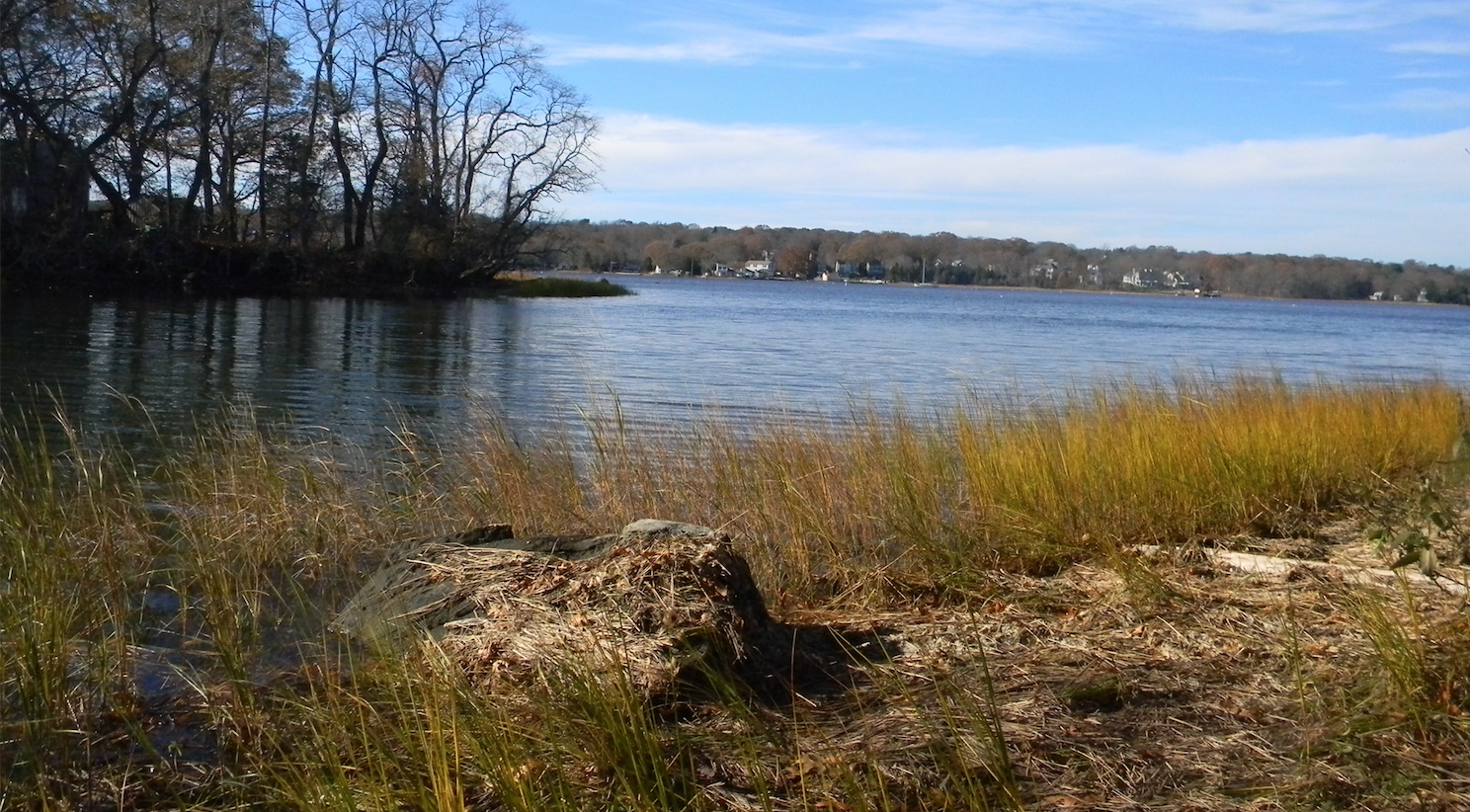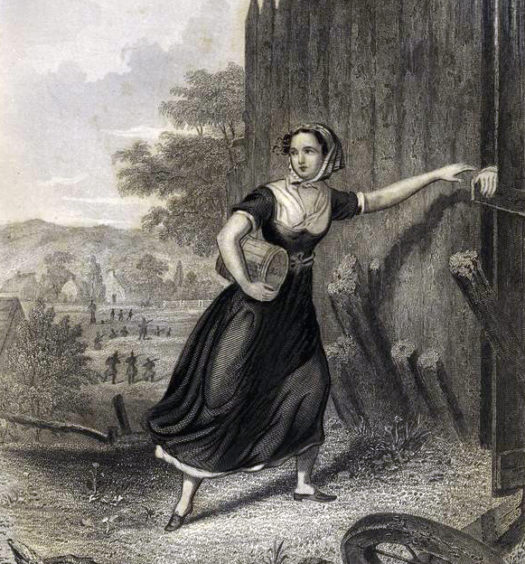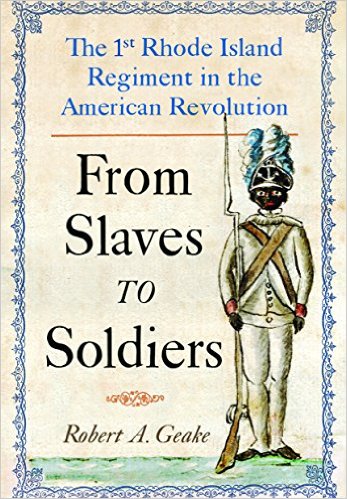The War of the American Revolution was in large part a young man’s war.
At the beginnings of the conflict, many well-educated young men who were descendants of some of the oldest families in New England had little prospects in their communities. Family holdings had by this time been divided among several generations, and they could no longer count on inheriting any substantial property, certainly not enough to produce the kind of income to which they were accustomed.
These sons saw the war with Great Britain not only as a way to serve the Patriot cause they believed in, but at the same time as an opportunity to gain credentials for political or public service in the years after the conflict. General Washington would ultimately find some of his best officers from the younger men of these families who sought honor and glory on the battlefield. Their journals during the war were often published, their heroism etched on monuments and written in local histories.
Many other young men, those who made up the bulk of the troops, came from far humbler origins. They had little prospects of rising in the ranks or achieving glory, and beyond their patriotic yearnings, they had an urgent need for steady employment, as well as room and board. That they traded in an attic room and featherbed for a tent and cot or a bunk in a wooden barrack, was of little consequence. The freedom, camaraderie, and opportunity for adventure found in an army or militia encampment was just as enticing as the thought of rations of rum and three square meals a day. Such notions however, did not always match reality.
A detailed account of life in a militia company may be found in the pages of Massachusetts militiaman Noah Robinson’s diary of his three terms of service, most of it spent with Colonel Timothy Dagget’s Regiment of Bristol County militia. Robinson and his regiment served mostly in nearby Rhode Island, where from December 1776 to October 1779 a British garrison held Newport and the rest of Aquidneck Island as well as Conanicut Island (Jamestown).
Noah Robinson of Attleboro (changed in 1914 from Attleborough), Massachusetts, was the son of a farmer whose descendants had been, along with the Daggetts, some of the earliest settlers in the community. Robinson was named for his grandfather, Lieutenant Noah Robinson, a local hero in the French and Indian War. By the time of the American Revolution, the family shared a simple farmhouse near the area known as Attleborough Falls, where the Ten Mile River passed above Towne Street.
Robinson first enlisted in 1777 as a substitute for another man who had been drafted, receiving payment from the man for enlisting in his place, as well as the bounty offered by Massachusetts, a not uncommon practice during the war. Robinson was likewise paid as a substitute in a subsequent year, when his last term of service was as a replacement for his uncle, Jonathan Stanley, who paid his then nineteen year old nephew forty-two pounds and twelve shillings, as well as some Twinings Tea.[1]
Well educated among his peers, Robinson was given the duty of company scribe in all three companies in which he served. He penned his journal, in addition to writing for his regiment daily reports, copying general orders, and transcribing muster and pay rolls. As a scribe he had many occasions to be in the company of officers and record the lives they lived in camp. As a private he was also assigned guard duty and often shared a tent with other common soldiers.
Robinson’s journal records the daily life of an encampment with all its tedium and tensions, its camaraderie and coexistence among men from varying backgrounds.
Food was often a keen concern for Robinson. Breakfast, for example, was always capitalized in his diary, and the penned descriptions of those sumptuous meals he shared in the company of officers are nearly so jubilant as to jump off the page.
In comparison, during those times when provisions were scarce, he casts a grim picture of the encampment, especially when he and the other soldiers from Attleboro were called into service in Rhode Island during the throes of winter.
Provisions were often difficult to obtain in these months. In November of 1777, while guarding the Kickemuit River in Warren, Rhode Island, Robinson was invited to dine with the officers. He arrived at the captain’s quarters to find “Roast Turkey and a supper cooked with the most splendor that circumstances would permit. Wine & Cyder was very plenty….”[2]
But just two days later, the company was reduced to baking a dish more popular in medieval times: “Awoke and had supper for breakfast. Stewd crows for Dinner with out bread. Crows for supper again with an Indian cake baked in the apples.[3]
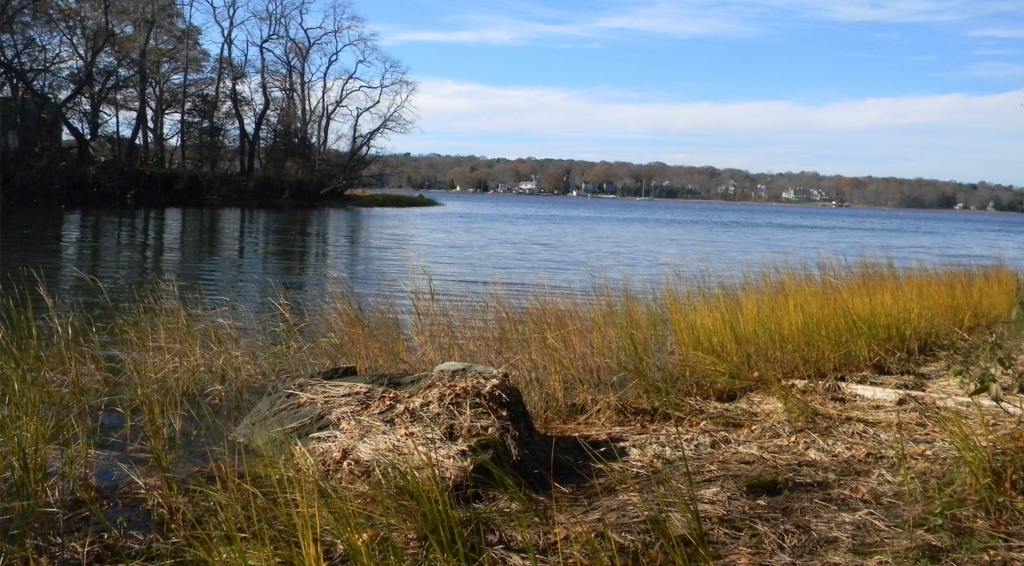
The mouth of the Kickemuit River in Bristol County, Rhode Island, as it enters Mount Hope Bay, a place guarded by Noah Robinson’s company throughout much of 1777-1778 (Robert Geake)]
Such was the unpredictability of procuring provisions. In one instance, as provisions could not be obtained locally, the captain of his company took a sailboat to Wickford and returned a day later with barrels of salted meat and cider as well as fresh vegetables.
Any shortages of provisions were typically offset by a seemingly endless supply of cider, wine, and rum. Alcohol could provide a safe way to drink stored water and the drink had some nourishment as well. Robinson and other militiamen often drank from morning to night in measured amounts to remain fit for duty. “Drank a dram for breakfast” opens the passages some days. However, there were also plenty of times recorded of men drinking freely at night, and awaking “on the flower.”
Men were also periodically given leave to return home, which led to the opportunity to be fed a few good meals, as well as the freedom to visit the many taverns that lined the routes the troops marched along to and from their various communities of Bristol County, of which Robinson and his fellow soldiers were well acquainted.
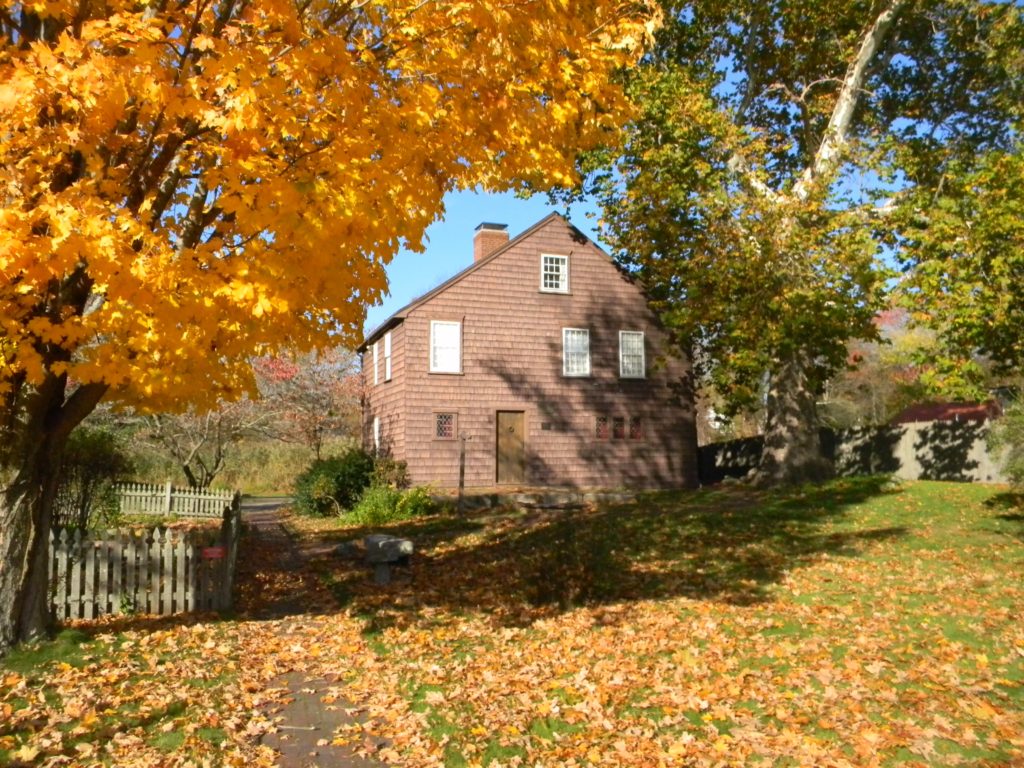
The John Maxcy Tavern served as a watering place throughout the war for local militia in what is now North Attleborough. The building is now a museum (Robert Geake)
Another peril Robinson and other militiamen serving in Rhode Island faced in the encampments was disease, which often came during an extended campaign or stay in the state. Sometimes disease ran so rampant in the ranks that a company was deemed unfit for service.
Serving in Warwick Neck during the first months of 1778, Robinson’s brother serving in an adjoining company fell ill with measles. On February 12, 1778, the weekly return of Surgeon’s Assistant Comfort Capron showed that seven men from his brother’s company were ill with the disease. One of them would die the following month. Other common ailments that afflicted the men in camp were dysentery, fevers, and the “carnal disease,” which Robinson and a few fellow soldiers would experience during his first tour of duty in Tiverton. The eighteen-year-old would record that those afflicted were treated with an ointment that likely contained arsenic, mercury, or sulphur, all commonly used cures of the time.
Robinson and Daggett’s Regiment were sent to Aquidneck Island shortly before the Battle of Rhode Island fought on August 28, 1778. Stationed on the east side of Aquidneck Island in a secondary line of defense to the east of Butts Hill, the men from Attleboro spent much of the afternoon of the battle crouched behind a stone wall while cannonballs whistled over their heads.
Robinson wrote about mishaps involving gunpowder. In the encampments at Fall River and Swansea that fall a soldier’s cartridge box exploded, and another’s tent caught fire “& caused a considerable combusture in camp.”
Reviewing Robinson’s diary during his last stint of service provides a glimpse into the daily life of the encampment and those culinary and other challenges often faced by the soldiers.
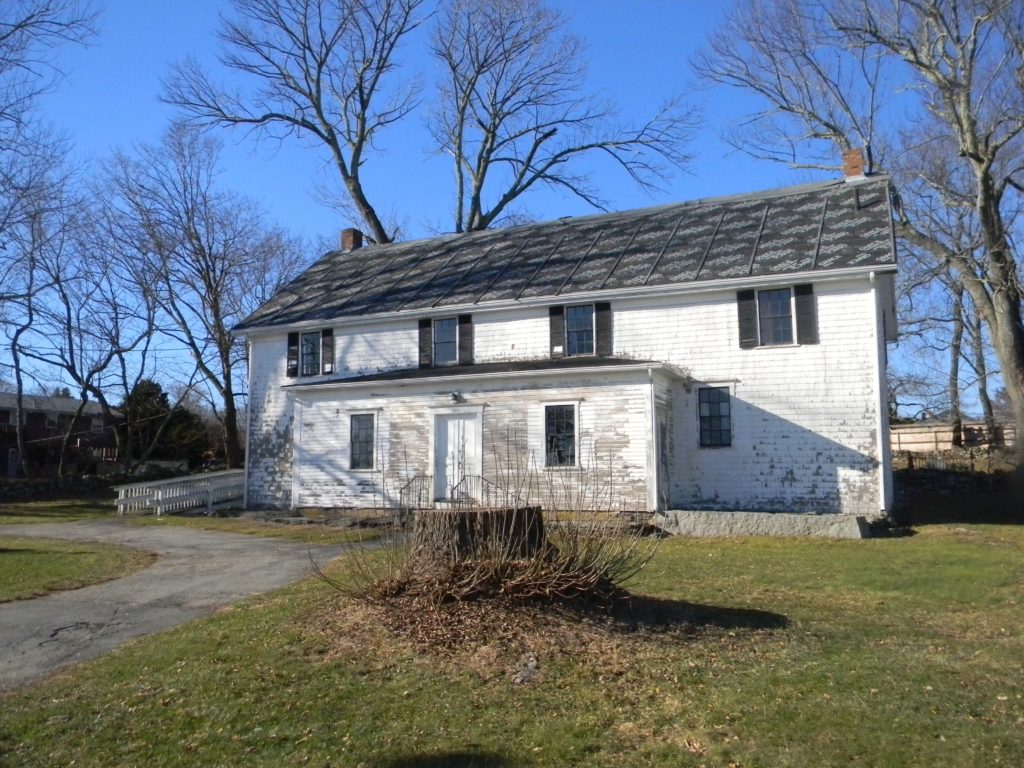
The Swansea Meeting House, where Noah Robinson likely heard the testimony of Patience Brayton Greene (Robert Geake)
Sent to Fall River in the fall of 1778, Robinson and his fellow militiamen from Bristol County marched about a mile-and-a-half from Slade’s Ferry, bought provisions at Church’s store, and then marched to a “hill east of Bardin’s Tavern” where they “pitched tent and fared very sumptuous for ye day.”
Bardin’s Tavern would be the scene of many a celebratory evening or “bang” as Robinson termed the parties, but it was also a place to seek shelter in inclement weather. Robinson often brought correspondence and other paperwork to the tavern on rainy days. Once, with time to spare in the tavern, he drew a ship in great detail that he had seen in a harbor.
One tavern Robinson frequented was operated by the Slades, the same family operating the ferry on the northernmost coastline of Fall River. The tavern was likely close by the ferry, for Robinson and others brought official papers to officers there and used it to hand out pay to soldiers.
After the Rhode Island Campaign, during the fall and into the winter, the regiment crossed the Taunton River numerous times between the encampment east of Bardin’s, and one in Swansea on the other side of the river at a place called Hogsneck. There, supplies were less abundant, and on September 8, Robinson grudgingly wrote, “Afternoon walked out of camp and bought some sausage. Returned & eat rice and cucumbers at night. Concluded supper eating the fourth pot of rice for the day among six[,] having no bread.”
The following day he recorded that the troops, “Eat dinner in ye field then returned home in ye rain & eat potatoes and meat without bread having had none in the mess for two days.”
Provisions grew shorter by October, and “suppawn” was relied upon for days at a time. A popular dish served in lean times, this meal was a porridge made from milk and corn meal. It was often served for breakfast, but sometimes the soldiers made do with the gruel for supper.
On October 2, a corporal was ordered to depart camp and look for bread as the soldiers had “neither bread, meat, or meal.” They had rice and milk for breakfast and supper for a few days, and on the 7th were informed they would be marching to Howland’s Ferry in Tiverton in two days. When the day of departure dawned, Robinson recorded that after his regiment assembled, “our milk being sower we ware obliged to march off without breakfast.”
Robinson’s company marched back that very day, and on the 10th drew provisions of bread and meat, along with nonfood items, soap and candles. While milk was plentiful on a daily basis, bread was becoming increasingly scarce. The same storms that had pelted the regiment in Tiverton and on Aquidneck Island in August had decimated crops throughout the region, and both civilians and soldiers were now facing shortages of flour. Livestock too had been killed in the same gales and now there was a shortage of it as well.
Communities during the war faced many hardships. Not only had they provided fathers and sons to serve the Revolutionary cause, each state, and thus each town, was required to provide a portion of the provisions needed for the Continental Army. Moreover, they were called upon by the state to provide for militia to patrol the shoreline and waterways of Rhode Island. While this was often a boon for merchants and tavern keepers, it was a strain on community farms and households, though Robinson writes often of families opening their houses or barns, even the community schoolhouse to board the soldiers.
To make matters more difficult, the winter of 1778 would prove to be among the coldest in memory. The harbors at Tiverton and Warren froze for weeks at a time. At Fall River, the Taunton River continued to flow, and the boatman still patrolled from Slade’s Ferry to Mount Hope Bay.
The men occasionally shot fowl from the shoreline, but often lost their kill to the wind and the tide. As with other New Englanders and their forefathers, they did not realize that lobster was a good food source.
During that winter, the troops received provisions from Slade and a man called Wilbour (likely an ancestor of the family that later opened the general store in Little Compton).
The daily duties of the camp kept the men busy and hunger off their minds. A generous supply of alcohol fueled the “parading for exercise” and guard duty at night.
Those men remaining in camp would often entertain themselves playing checkers, or with “sings”, or stories, a pastime always accompanied by cider or grog. The nearby taverns of Bardin’s and Slade’s also provided places where there were sometimes ladies and a fiddler to enliven the company. Robinson, as a scribe for the regiment, also had the good fortune of meeting ladies who came to visit the officer’s quarters, typically a house taken over by the army during the time a regiment was stationed nearby.
Unlike the Continental Army in which ladies often served as washer women and cooks for the soldiers, and sometimes performed other services for pay, the militia companies had no women in camp among them. For those who would visit the officer’s quarters, there was sure to be wine and money freely given; but only to a chosen few. Occasionally some women came to visit militiamen, often relatives bringing clothes and gifts. Others provided a “sing,” or sing-a-long with no doubt a Christian-minded theme; the men in encampments were often made to wait for “bundling” with a woman until granted a furlough for a visit home.
Robinson received such a furlough for a few days on November 23 and the following morning he “awoke very early Marched for home by Day light…marched as far as Mr. Goff’s in Rehobeth about twelve miles where we had a very good Breakfast on freecost [for free], then marched on for Doriah’s and drank some brandy, the Richardson’s tavern and drank egg pop then put on to Col. Richardson’s and dined with him-then put on through the neighborhood and found my friends all well and I was happy to find my Father in the same state.”
On Thanksgiving Day, after a round of visits the night before, Robinson returned home in the morning and changed. But he arrived at church when the minister, Mr. Welds, was half-way through his sermon. Leaving church, he quickly moved on to more secular affairs: “After meeting went to Mr. Daggetts, bought two tickets, in company with RS, then drank with my friends and had some discourse with Richardson concerning a Bang for (that) night in which we seemed somewhat divided, however we settled the affair in my favour-then we returned to Uncle J’s and eat the fat and drank the sweet.” He later borrowed a horse to reach the party he had planned earlier in the day and returned home around two o’clock in the morning.
Robinson did not record what he did but on Saturday morning, but the next day he “Arose and Pack’d up and marched from home (the sun about an hour high).” He took his cousin Rial Stanley in company, and together they “made several stops through the neighborhood and took on our backs some cloathing to carry to the camps.” They arrived back in camp by sunset, or in Robinson’s words, “Day light down.”
On his return, the clerk returned to the daily ground, preparing muster rolls and payrolls at the captain’s quarters.
On December 3 Robinson was informed that he had been promoted to the rank of sergeant in Captain Joseph Cole’s Company. He celebrated the following day with his friend, Sergeant Smith: “Attended Roll Call then took a walk out of camp with Sergt. Smith. Stopt at Chaces Tavern and drank; then walked on about three miles from camp to a gold smith’s[4] then returned to Chases and drank Sangarea [sangria wine] and got Dinner. Then returned home the sun about one hour high.”
He purchased a meal at Slade’s. His company spent the next two days eating suppawn, but by the afternoon of the 6th, they “had an excellent dish of Bak’d beef for dinner.”
Just before nightfall, after the captain had given a dram to each soldier, Robinson wrote that “we marched after sunset to Slades Ferry and passed muster by candlelight…returned and went with Capt. Stanley over to the Capt’s quarters and draw bread, then come back and supped, then had several ladies to set with us who favored us with singing several pleasant songs; wherefore the evening passed agreeable to all ye company.”
On the 15th of the month Robinson was paid wages “for my present service” in the amount of fifty pounds, fourteen shillings, eight pence. Two days later, though, a “windy & lousy day,” he walked to Wilbours and made restitution for the “milk, meat, potatoes, fowls & etc…” he had been provided during their stint.
Knowing the company’s term of service was near an end, he busied himself the next few days with payrolls.. On Sunday, December 20th, he took a walk with Mr. Willmarth about a mile from the Swansea encampment to a Quaker meetinghouse, where the soldiers heard “the discourse which was carried on by womankind, and was nothing very awakening in my opinion.” Robinson could have heard the witness of Patience Greene Brayton, a minister and abolitionist who traveled on occasion far from her Swansea meeting house throughout New England, as well as to meetings in Philadelphia during her lifetime of ministry.
The remainder of the month passed in much the same manner. By the 22nd he recorded that “there was considerable snow on the ground.” The payrolls still needed to be finished, but Robinson was already thinking of his future away from the militia.
On the 23rd of the month Robinson recorded odd behavior he had engaged in: “Last night at going to bed tried the following project (viz) Took the quarter off my Right Leg, and went out doors & named three starrs. Winding the quarter around my left thumb once at each name then un drest and put my quarter under my head & went to bed backwards with out any discourse until I had counted twenty backwards and forwards…I dreamed about one of the names which I gave to the stars.” Robinson was likely referring to Abigail Draper whom he would marry after the war.
On Christmas eve Robinson feasted on baked mutton (an “exceedingly cold day”), and Christmas Day too passed with little fanfare. “This being a day called Christmas;” Robinson wrote, “there was to be a cock fight about half a miles distance so I left my writing and went with the Officers to the battles, but it not being very entertaining to me, I returned home.” It seems Christmas was not celebrated to the extent it is today.
The cold and shortages of provisions continued. On the 27th Robinson “Arose and found the face of the earth covered with snow.” He spent the day writing but by next afternoon was sent back to Wilbour’s to borrow bread, “who promised he would not lend us much longer, saying the state might feed us or we go without.” Wilbour was probably complaining that the state was slow in paying his invoices.
Robinson and the rest of the men in his regiment were dismissed at sunrise on December 29, and as the troops “blustered around], turning in cartridges, camp utensils, and other tools,” Robinson made his way back to “settle with Mr. Wilbour and bid [him] good cheer.”
By one in the afternoon the troops had “marched for home over banks and valees . . . . Marched as far as Miles Bridy (and our company being four in number) (viz) G.S.V., E. Wilmarth, R. Stanley and myself we drank two mugs of flip then put on feeling very happy… Some of the company was almost beat out before we got to Morses in Attleborough it being about ten at night. Then drank and warmed and marched on again and arrived at home about 2 o’clock … and found my Father well.”
The following day, December 30, had been declared a day of thanksgiving by the Continental Congress, and as was the custom on those state and federally declared holidays, families and friends gathered to celebrate at home and walked together to the meetinghouse.
That evening, Robinson and his cousin Rial Stanley joined others at a community sing and fiddle dance in the town schoolhouse.
Another round of visits to family members and friends occurred the next day. He ended the evening of New Year’s Eve at his Uncle William Stanley’s where a fiddler entertained the gathered “gentlemen and ladies” and “the evening passed in jollity.” “Contrary to our present custom, it was an early evening,” the former militiaman wrote. Robinson recorded that “about 9:00 o’clock returned home and turned in, thus the day and the year passed and is gone.”
On January 1, 1779, Robinson awoke to “A very pleasant morning, so I arose and discharged about half a dozen guns for a happy New Year.” The reports of his musket shots were answered from across Attleborough Falls by his cousin and fellow militiaman, Rial Stanley.
Robinson’s term of service was over. It would be the end of his service in the Massachusetts militia. He had left the farm and seen a small part of the world not far away in the service of his country, but he returned home. It was home and family, and perhaps his faith, that kept him close to his community.
Within the last few pages of his diary is written a cautionary proverb from presumably his own experience:
Let not man think his purse and cloathes give him eternal happiness
or continual contentment and promotion
But each one walk in peaceably and contentedly on his allotment
and not be led by Pride and the Devil
who are the destruction of many in this world,
and that which is to come…
Yours,
Noah Robinson”
[Banner Image: The mouth of the Kickemuit River in Bristol County, Rhode Island, as it enters Mount Hope Bay, a place guarded by Robinson’s company throughout much of 1777-1778 (Robert Geake)]
Notes:
1. Noah Robinson Journals, Volume 5, MSS 1132, Collection of Men’s Diaries, Rhode Island Historical Society.
2. This and subsequent passages are from a work in progress tentatively titled Fired a Gun at the Rising of the Sun: The Journal of Noah Robinson of the Attleborough Militia in the Revolutionary War, transcribed and annotated by Robert A. Geake, 2018.
3. Ibid.
4. Likely Benjamin Burt, Jr., who followed his father into the family business in Little Compton. He was also the brother of John Burt who graduated from college in 1756 and became an ordained minister in Bristol, Rhode Island. Sickly when the British attacked the town in October 1775, he had dropped dead in a field attempting to escape the bombardment. (John Eliot, A Biographical Dictionary: Containing A Brief Account of the First Settlers and Other Eminent Characters Among the Magistrates, Ministers, Literary and Worthy Men of New England (Boston, MA: Cushing & Appleton, 1809), 108.

